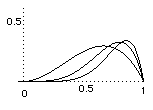Hence prove that if a sequence (a1, a2, ...) in R2 is convergent in the metric d1 then it is also convergent in d2 and d∞.
Prove also that d1(P, Q) ≤ √2 d2(P, Q) and d2(P, Q) ≤ √2 d∞(P, Q).
Deduce that if a sequence (a1, a2, ...) in R2 is convergent in one of the metrics d1, d2, d∞ then it is convergent in all of them.
The graphs of fn for n = 2, 4, 6 are shown on the right.
Prove that the sequence (fn) converges to the 0-function in the metric d1 on the space C[0, 1] of continuous functions on [0, 1].
Use the usual method for finding the turning point of a differentiable function to find the maximum value of fn on the interval [0, 1].
What is the limit of this maximum value as n→ ∞? (Use Exercises 6, question 7.)
Deduce that (fn) does not converge to the 0-function in the norm d∞.
a) Define a function f on a real-number x by taking the decimal expansion of x (terminating in infinitely many 0's rather than infinitely many 9's if it is an exact decimal) and discarding the first, third, fifth and so on, decimal places.
So, for example, f ( 0.1234) = 0.24, f (0.1415926536...) = 0.45256... .
b) Define a function g on a real-number x by taking the decimal expansion of x and replacing 0's by 1's, replacing 1's by 2's and so on except that 9's are replaced by 0's.
So, for example, g(0.1298) = 0.23091111... (since the infinitely many 0's at the end all get replaced), g(0.1415926536...) = 0.1526037647... .
c) Define a function h on a real-number x by taking the decimal expansion of x and replacing 0's by 9's, replacing 1's by 8's , 2's by 7's, 3's by 6's, 4's by 5's and vice-versa.
So, for example, h(0.1298) = 0.9701999999... = 0.9702 (since the infinitely many 0's at the end all get replaced), h(0.1415926536...) = 0.9594073463... .
[Hint: Observe that the sequence (0.49, 0.499, 0.4999, ...) converges to 0.5 and use the sequential definition of convergence.]
